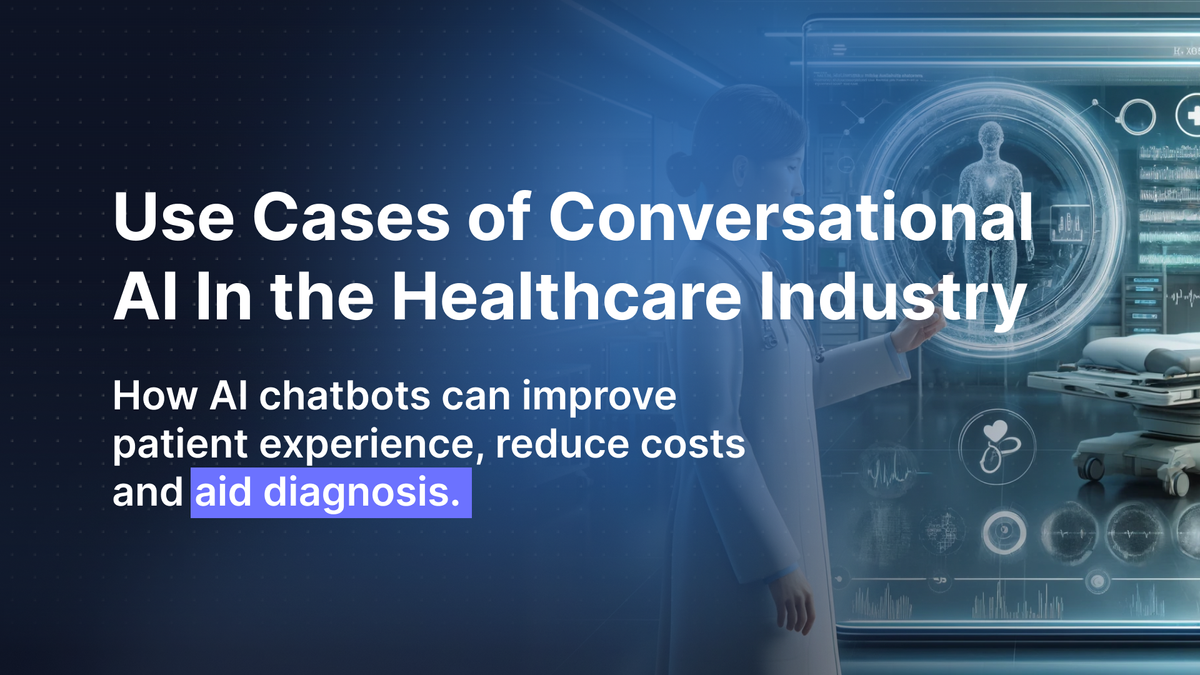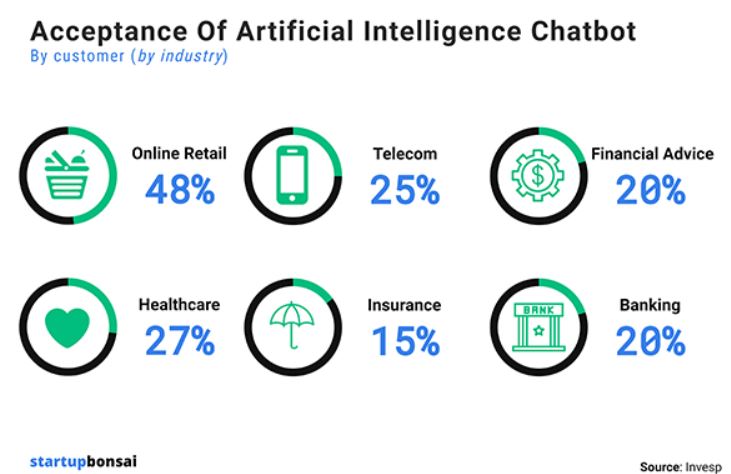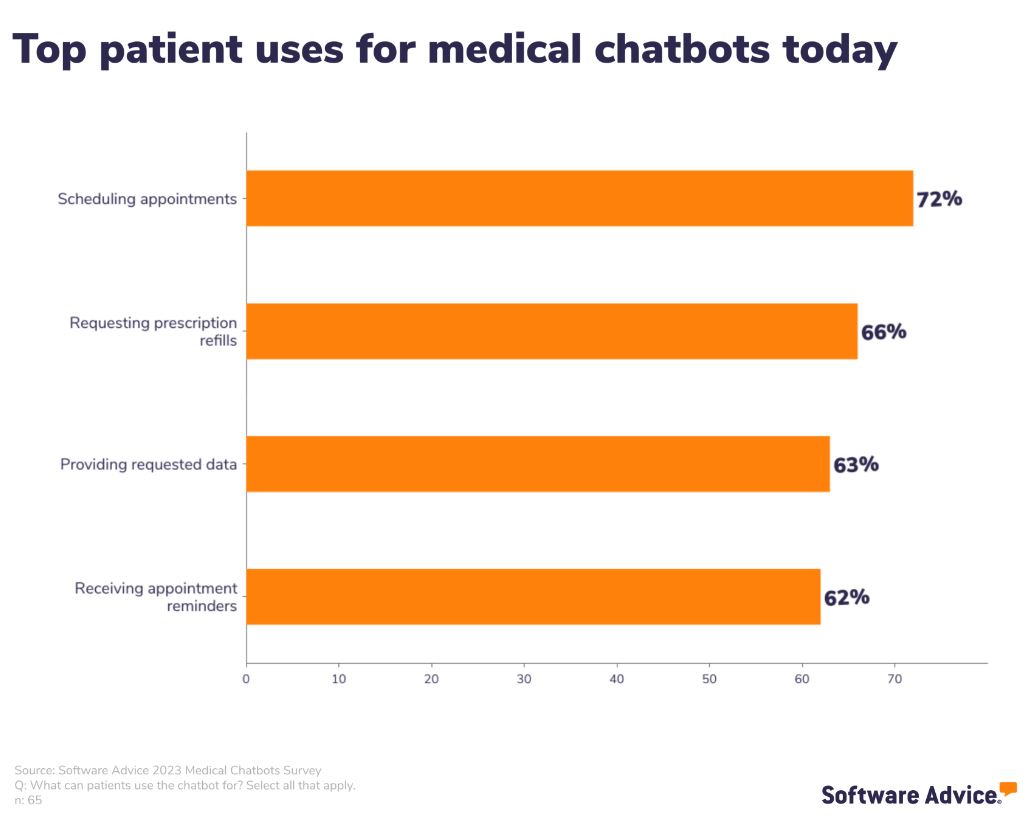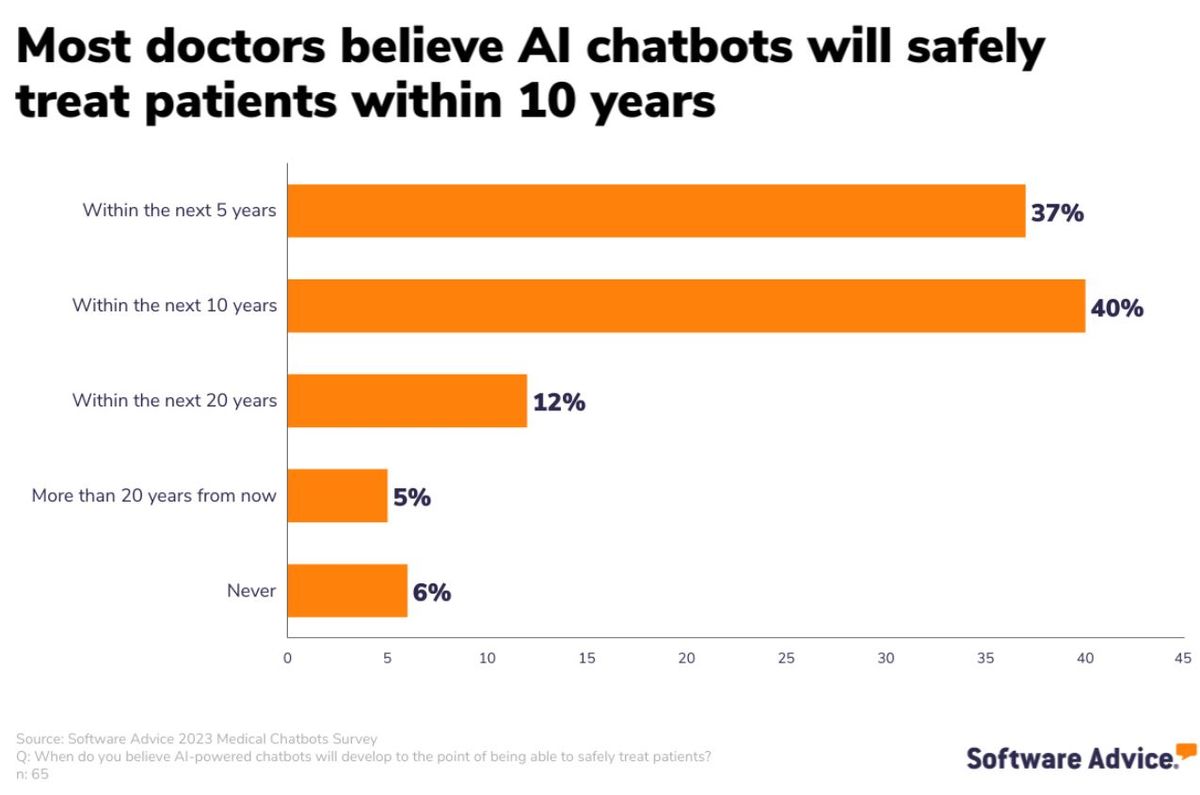Explore the potential of conversational AI in healthcare. How AI chatbots can...

As in every other industry, conversational AI has become necessary in healthcare to provide exceptional service. Conversational AI offers many benefits, from streamlining administrative tasks to providing 24/7 patient support. However, the stakes in healthcare are undeniably high. Unlike other fields, patient data, diagnoses, and even lives can be at risk if technology is not implemented responsibly.
This guide highlights the exciting potential of conversational AI in healthcare. We'll explore the development of AI use cases in healthcare that can significantly improve the patient experience and healthcare delivery, along with the ethical and professional challenges associated with this technology.
Conversational AI for healthcare uses NLP, machine learning, automation and other AI technologies to enhance and personalize the healthcare experience for patients and healthcare professionals. Its intent recognition and predictive analysis capabilities allow healthcare professionals to offer proactive help and manage their professional responsibilities more effectively.
Conversational AI applications such as AI chatbots are transforming the healthcare industry today. They work as smart assistants who can streamline tasks across the entire care journey, from scheduling appointments and medication reminders (diagnosis) to post-care support and managing clinical data and administrative issues.

Source : Startup Bonsai
Conversational AI in healthcare is a helpful companion, supporting various aspects smoothly. Let's take a look at some prominent examples of AI chatbots in healthcare:
To understand conversational AI in healthcare, let's look at the top 10 AI chatbot use cases in healthcare.
Research shows that around five per cent of people who seek medical care suffer from a delayed or wrong diagnosis. This is usually because of incomplete information and an overwhelming load on healthcare providers. Conversational AI chatbots can significantly reduce this burden by assisting with early screening and diagnostic preparation. Here's how:
The average wait for an appointment with a physician for a new patient is almost 26 days. Conversational AI eliminates the hassle of appointment scheduling. A survey shows that 55% of healthcare practices that use chatbots for patient self-scheduling can save up to 1 hour per week.
It is a 24/7 assistant who can connect you directly with your preferred doctor for an appointment that fits your needs. If your doctor isn't available, the AI can suggest options with other practice professionals, saving you time and frustration.

Source: Software Advice
Long waiting times to see healthcare professionals can be frustrating and painful. Conversational AI in healthcare can bridge this gap by offering patients 24/7 access to reliable health information and support. Chatbots can:
This readily available support empowers you to take charge of your health and make more informed decisions.
Use of chatbots in health care goes beyond automation and creates a personalized and empathetic healthcare experience. AI Chatbots can act as your healthcare companion, reducing stress and empowering you to manage your health. Here is how:
Conversational AI can easily tackle the dreaded task of medical billing. AI chatbots are a secure and convenient way to handle payments. You can receive clear explanations of your bill, ask questions, and even make secure online payments – all within the chatbot. This eliminates the hassle of phone calls and waiting times, improving efficiency and clarity for a smoother financial healthcare experience.
Navigating the complexities of the health insurance process can be extremely stressful, especially when facing health concerns. Conversational AI in healthcare can alleviate this burden with the help of AI chatbots.
They can guide you through the claims process, explain payment plans, and clarify which medical services and incentives you're eligible for. This eliminates stress and empowers you to understand your insurance coverage, making healthcare financially less daunting.
Conversational AI doesn't stop its support after an appointment. They can offer continuous medical and moral support, reminding patients about follow-up visits, medication refills, and even gentle reminders for walks, exercises, or dietary restrictions, all tailored to a patient's recovery plan. This ongoing support from chatbots helps a patient stay on track and promotes a smoother, more complete healing journey.
A little empathy goes a long way and brings comfort in challenging situations. Chatbots can offer gentle encouragement and emotional support throughout your recovery. They can send uplifting messages that acknowledge your challenges and celebrate your progress. This touch of empathy from a chatbot can make a big difference in your healing journey. For example:
Conversational AI is gradually transforming remote healthcare and making it accessible to the masses. It's like visiting a doctor but virtually through a chatbot. AI chatbots can conduct basic consultations, assess symptoms through a series of questions, and even offer mental health support.
This allows for convenient access to care and triage of non-emergency situations and provides a readily available resource for mental health concerns, all from the comfort of your home.
Conversational AI chatbots are a great source for collecting healthcare feedback. Since they are continuously conversing with patients, you can easily gather feedback on their experience, specific services, or areas for improvement. It's a convenient way to gain valuable insights that can help enhance patient care and satisfaction.
Let's look at the numerous benefits conversational AI brings to the healthcare industry.
In healthcare, time is critical. Conversational AI chatbots offer a lifeline of 24/7 support. Whether you need general guidance or an emergency appointment scheduled, these AI assistants are available anytime, day or night, potentially making a crucial difference in time-sensitive situations.
Conversational AI significantly enhances the patient experience by eliminating long wait times typically associated with traditional clinic visits. Chatbots can handle multiple queries simultaneously, providing immediate access to information and support. Whether you have questions about sensitive topics or prefer text, voice, or even video interaction, chatbots offer a convenient and personalized approach, leading to a more positive healthcare experience.
Conversational AI offers a cost-effective solution for both healthcare providers and patients. By automating workflows, appointment scheduling, and administrative tasks, chatbots free up staff time and resources for higher-value activities.
For patients, remote consultations and readily available information reduce unnecessary in-person visits, saving time and money on transportation and potential co-pays. This creates a win-win situation for all parties involved.
Conversational AI gives you access to valuable patient data. Patients can share symptoms, medication use, and health concerns by interacting with chatbots.
This data integrates seamlessly with electronic health records, providing healthcare professionals a more holistic view of their patients. Additionally, anonymized data trends can be used for research, leading to better treatment plans and improved symptom management in the future.
While conversational AI offers immense benefits to the healthcare industry, it's essential to consider some key ethical and professional challenges before implementation.
One major challenge with conversational AI in healthcare is data privacy. Statistics show that 30% of all major data breaches occur in hospitals. Healthcare data is highly sensitive, and breaches can have serious consequences. As AI adoption grows, ensuring that patient information is only accessible to authorized personnel and not shared with third parties without proper consent is critical.
While conversational AI can be a valuable tool, it cannot replace the expertise of human healthcare professionals. Chatbots are not designed to diagnose complex illnesses or provide comprehensive treatment plans. Clear limitations and appropriate disclaimers are necessary to guide patients towards qualified healthcare providers when needed.
With AI making decisions and recommendations, it's crucial to understand how these decisions are made. This is particularly concerning in healthcare, where decisions directly impact human life and well-being. All medical information or advice conveyed through these applications must be 100% accurate.
Conversational AI (CAI) has undeniably made a significant impact in healthcare and it's only going to get more impressive. E.g AI chatbots powered by generative AI. While there may not be a completely independent “Doctor chatbot” that replaces human physicians, conversational AI still holds immense potential for the future such as early disease detection, assisting surgeons, and creating personalized treatment plans. This leads to better diagnoses, improved surgeries, and ultimately, a healthier future for all.

Source: Software Advice
Conversational AI is continuously reshaping the healthcare industry, offering a multitude of benefits for both patients and healthcare providers. From 24/7 support and enhanced patient experiences to cost-effective solutions, AI chatbots are transforming the way we interact with the healthcare system.
The use of AI support and AI chatbot customer service for your healthcare setup can be a game changer that streamlines operations, empowers patients, and delivers a more positive and efficient healthcare experience.
However, alongside these advancements, it's crucial to acknowledge and address the ethical and professional challenges associated with conversational AI when implementing these technologies.